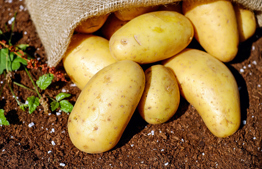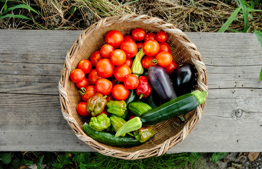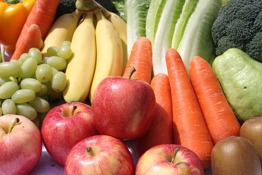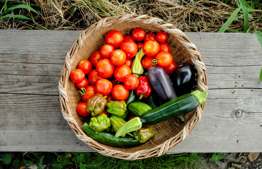Orlah and terumot and ma'aserot for fruits and vegetables exported from Israel

Halachic guidelines from Torah VeHa'aretz Institute for Jews living abroad buying Israeli produce, regarding orlah and terumot and ma'aserot.
Click here to download this article in PDF form.
Abstract
Halachic guidelines from Torah VeHa'aretz Institute for Jews living abroad buying Israeli produce are as follows: one should separate terumot and ma'aserot without a blessing. There is no concern that exported fruit is orlah.
Terumot and Ma'aserot for Exports Today
For the Israeli Chief Rabbinate's fruits and vegetables export policies, click here and here. It says that while the halachic guidelines for exporters are to separate terumot and ma'aserot, most packaging houses do not comply. Indeed, Rabbi Mordechai Biderman, head of the Department of National Kashrut – Mitzvot Related to the Land of Israel in the Chief Rabbinate of Israel, told me (5779) that today most exported produce is untithed. Such produce does not bear the Chief Rabbinate's kashrut certification. Exporters claim that most of the produce is sold to non-Jews, in any case, and they do not want to lose out on more than 1% of the produce!
Rabbi Biderman informed me that the Chief Rabbinate has not changed their guidelines and that they were the same in the past, in keeping with the consensus among most poskim.
How should terumot and ma'aserot be separated abroad? In principle, the standard procedure should be followed, but without a blessing. See the text by the Chief Rabbinate in Hebrew here, and our text in English, here.
Terumot and Ma'aserot: Halachic Survey
In practice, it is best to be stringent and separate terumot and ma'aserot without a blessing if one purchases Israeli imports. However, some are lenient bedi'avad due to sfek sfeka (see below).
Brief Halachic Survey – Exported Fruit
According to the Ra'avad, there is a rabbinic obligation to separate terumot and ma'aserot; according to the Rambam and the Shulchan Aruch this produce is exempt from terumot and ma'aserot (Rambam, Hilchot Terumot 1:22; Shuchan Aruch, YD §331:12).
Most poskim follow the Rambam and the Shulchan Aruch. What happens according to the Rambam's opinion if the produce is exported after miru'ach; that is, after gemar melacha—the produce completed its process of preparation for sale and it is already a finished product. Today, produce is generally exported after miru'ach.
There are three main interpretations of the Rambam and Shulchan Aruch:
- According to the Mishne Lamelech (on Rambam, ibid.), Radbaz (on Rambam, ibid.), Responsa Mabit (2:196) – such produce is obligated in terumot and ma'aserot.
- The Maharsham (Responsa 1:72) obligates tithing only if miru'ach is performed without a specific intention. However, if processed with the specific intent to export abroad, then it is exempt.
- The Bach (YD 331, incipit ve'im nikbe'u lema'aser) and Mahari Kurkus (Rambam, Hilchot Ma'aser 13:4) hold that this produce is exempt regardless.
The Chazon Ish (Demai 5:3, 15:4) holds that one should be stringent and separate terumot and ma'aserot. Rabbi Avraham Yitzchak HaCohen Kook (Mishpat Kohen 46) is stringent, but also writes that it is possible to be lenient in certain instances of doubt.
Rabbi Shaul Yisraeli (HaTorah VeHa'aretz II) rules that in practice one should be stringent and take terumot and ma'aserot, but without a blessing (due to the doubt). This is also the position of the Minchat Yitzchak (1:84), who was asked about oranges exported from Israel to England.
The Israeli Chief Rabbinate advises separating terumot and ma'aserot from produce exported from Israel.
Various Israeli rabbis told me that they had believed the Chief Rabbinate's instructions were not to separate terumot and ma'aserot from such produce. Perhaps these were old guidelines or possibly a misunderstanding. Rabbi Biderman told me that the official guidelines in the past were the same, but that the farmers and packaging houses simply did not comply with them. According to those who are lenient on the matter, I'm not sure if the main reason for the leniency is that most end-consumers abroad are non-Jews, or that they follow the opinion that this produce is exempt from terumot and ma'aserot. In any case, when separating terumot and ma'aserot from produce earmarked for export, a blessing is not recited.
Additional material is available on the topic below (in Hebrew):
- For a brief article by Rabbi Ehud Ahituv (5762), of Torah VeHa'aretz Institute, click here.
- For a longer article with sources by Rabbi Yaakov Epstein (5770), of Torah VeHa'artez Institute, click here.
- For A long article by Rabbi Shaul Yisraeli, HaTorah VeHa'aretz II (5751), click here.
Practical Guidelines for Separating Terumot and Ma'aserot
The official guidelines of Israel's Chief Rabbinate are to separate terumot and ma'aserot from produce exported from Israel. However, it is possible that certain packaging houses do tithe this produce.
If purchasing Israeli produce abroad:
Lechatchila, separate terumot and ma'aserot without a blessing, since most probably this produce is untithed. Most poskim are stringent on the matter, following the Ra'avad's opinion. Today it is possible that the produce is exported after gemar melacha, so even the Rambam might agree that terumot and ma'aserot should be separated from Israeli exports.
However, there are those who are lenient bedi'avad, due to sefek sefeka (a double or multiple doubt) regarding the rabbinic prohibition. These doubts include: a halachic doubt as to whether Israeli exported produce is exempt from terumot and ma'aserot when earmarked for export and a doubt as to whether the produce was tithed in Israel. Moreover, today the obligation to separate terumot and ma'aserot is rabbinic because the majority of Jews do not yet live in Israel (bi'at kulechem); customers are obligated to tithe only rabbinically. It is also possible that the produce grew in the olei Mitzrayim borders or in hothouses (here, there is a lesser-level obligation); the obligation to tithe produce other than grains, olives (and its products), and grapes (and its products) is rabbinic according to certain opinions, while the obligation to tithe vegetables is rabbinic according to all poskim.
Guidelines by Torah VeHa'aretz Institute
It is preferable to be stringent and separate terumot and ma'aserot without a blessing on produce meant for export.
Those living abroad purchasing Israeli produce should separate terumot and ma'aserot without a blessing (see the text here).
Orlah
For guidelines by the Israel Chief Rabbinate, Iyar 5777, click here (the same file for terumot and ma'aserot, above).
For the list of farmers under the Chief Rabbinate's supervision regarding orlah, as of Tishrei 5779 (winter and summer fruit, grapes, lemons, Valencia oranges), click here.
Possible Orlah – from the Chief Rabbinate's Post
"There are several types of fruits that are exported abroad, and in light of the current situation (Iyar 5777), it is possible to consume them without concern of the orlah prohibition. This is in light of the fact that they are packaged in large packing houses that are under rabbinate supervision, or due to the low percentages of orlah there. The following types of fruits can be eaten without concern of orlah:
All citrus fruits (oranges, grapefruit, easily-peelable fruits [tangerines], pomelos), persimmons, avocados, mangos, pomegranates, dates".
However, it seems that orlah could be a problem for other types of fruit!
I was told that for other fruits such as grapes and exotic fruit like papaya and passionfruit, the rabbinate has less control. This is because they are packaged directly by the growers and do not pass through packing houses. This means that there might be an issue of orlah fruit. Of course, it is also linked to the percentage of orlah fruit, and the related halachic rulings in this context.
Most Israeli fruit exports do go through packaging houses, since at times they need to receive cold treatments or other treatments available only in packaging houses. The Chief Rabbinate does not allow any orlah fruit enter packaging houses whatsoever. During trees' orlah years, the Chief Rabbinate's kashrut supervisors remove the fruit from the trees before they develop.
Rabbi Yoel Friedemann of Torah VeHa'aretz Institute believes that one need not be stringent in this matter, and that stringency is unnecessary. In practice, the direction not to purchase fruits that do not appear on the list above in light of possible orlah is nearly unfounded – it is very rare, in any case.
Dr. Akiva London, the head agronomist of the Chief Rabbinate, also believes that there is no problem of orlah outside of Israel (and in Israel, too, he believes that there is no issue with the vast majority of fruits since more than 90% from the orchards are under the Chief Rabbinate's supervision. To export fruit, an export license is required for each country of export, and only major companies and packing houses hold this license (approximately 100; for the list of citrus exporters as of 2016, see here, and exporters for other types of fruit as of 2011 here). Most of these major companies are under rabbinate supervision. There are hardly any farmers who cultivate crops exclusively for export; farmers who grow crops for local sale need rabbinate supervision, and the rabbinate supervises all of the farmer's fields and orchards, not only crops for sale in Israel. Some 10–15 years ago, orlah fruit was permitted for export, but today this is no longer the case.
Orlah vis-à-vis papaya is under rabbinate supervision. For passionfruit, the rabbinate relies on the opinion that it is a vegetable, unless the end-customer requests otherwise.
Grapes are examined comprehensively for all registered and major vinegrowers.
Note that blueberries growing in Israel pose a serious issue of orlah! For this reason, blueberries grown in Israel should not be purchased without kashrut certification (in Israel or abroad)!
From the official data of the Ministry of Agriculture on fruit and vegetable export, the fruits exported in large quantities are included in the Chief Rabbinate's list above of the fruits do not have orlah issues. Today, export is primary to Europe, China, Japan, Russia; small quantities are exported to the USA (mainly citrus fruit).
For data on the quantities of fruits and vegetables exported from Israel in 2018, see here. The main fruits exported are: avocado, dates, mango, pomegranate, and persimmon—are all included in the list of orlah-free export fruit. The citruses that are exported extensively are also on the Chief Rabbinate's "white list."
From the data, we see that there is no need for concern regarding orlah for fruit exported from Israel. Bon appetite!




